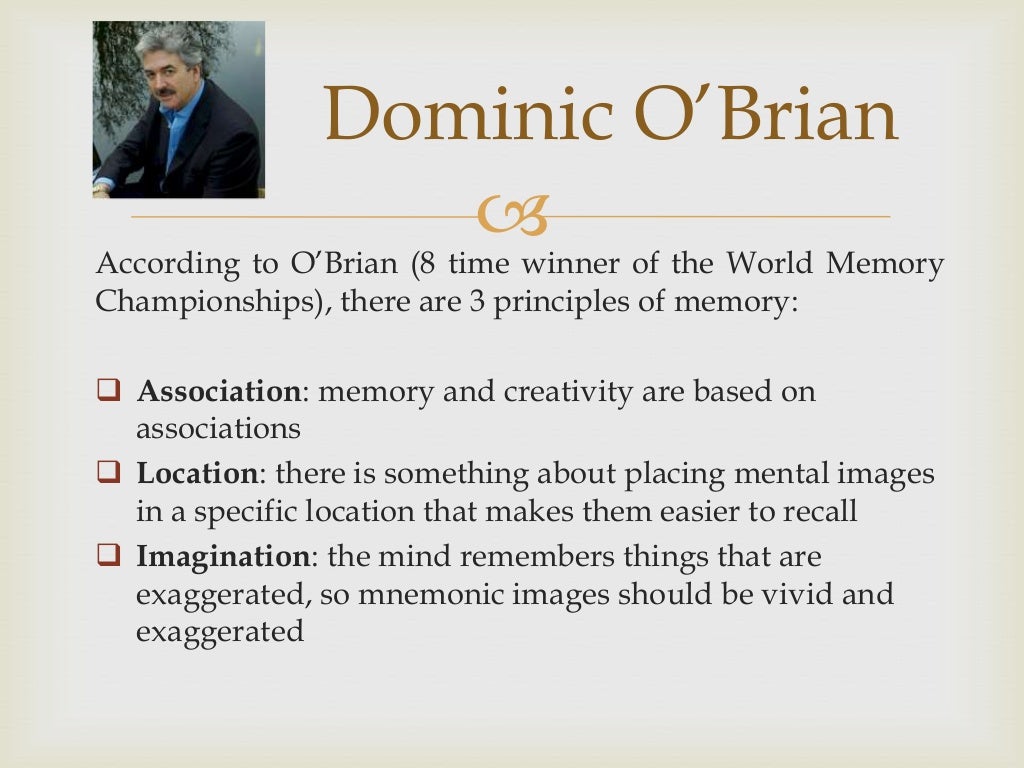

It is based on the idea that short-term memory is limited in the number of things that can be retained. For example, “My altruistic Aunt Alice gives great gifts.” ChunkingĬhunking is a memory technique of breaking information down into groups or units. When you have to learn vocabulary words, just write the new words, write the definitions next to them, and then write a person, thing, event, movie, or any strong association to help you remember the meaning of each word.
#MEMORY MASTER TECHNIQUES MOVIE#
For example, you may connect what you are trying to learn with someone you know, or with a movie character or scene. So the combination is 13, 3, 89.Īnother learning strategy is to associate, or “connect,” each word or event with a person, place, thing, feeling, or situation. 13th), then the number of dates I had last year (3), then the score on my first calculus test (89). For example, the combination to my gym locker is the day my sister was born (Jan. The more organized the information, the more successful your brain will be in locating the information.īy recalling something you already know and making a mental link to what you are trying to learn, you can help yourself recall the new information. This helps to make the information meaningful and aids in the organization and structure of the material. AssociationĪssociate new material with things you already know. You can remember the order of the planets by the sentence “ My very elegant mom just served us nine parrots” (representing Mercury, Venus, Earth, Mercury, Jupiter, Saturn, Uranus, Neptune, Pluto). My Dear Aunt Sally (mathematical order of operation: multiply and divide before you add and subtract). As a substitute of making new word, even if, you use the letters to make a sentence. Similar to acronyms, an acrostic is a sequence of letters that helps you remember a poem or other text. Interphase, Prophase, Metaphase, Anaphase, Telephase Acrostics Red, Orange, Yellow, Green, Blue, Indigo, Violet Parenthesis | Exponents | Multiplication | Division | Addition | Subtraction PEMDAS, sequence in solving or evaluating math equations To create acronym, take the list of words or facts that you want to remember and put them in an order so that the first letters of each word spell a real word or a made-up word. In school, students are often taught to use the acronym HOMES to remember the five Great Lakes (Huron, Ontario, Michigan, Erie, and Superior). Each letter is a cue to an item you need to remember. However, for the purposes of memory techniques, any acronym that can easily be remembered would qualify.įor memorization, an acronym can simply be an invented combination of letters. However, according to the strictest definition of an acronym, only abbreviations that form a pronounceable word qualify as an acronym. Generally, acronyms are considered any words formed from the first letters of a list of words.

Opinions differ on what constitutes an acronym. We are more likely too to remember things that are amusing or silly or vivid.We tend to remember things that interest us or are made memorable in some way.In fact, our memories are probably much more similar in capacity and operation than we think. There is a myth that some people have fantastic memories and some cannot remember anything. Commonly used examples of these memory techniques include acronyms, acrostics, or chunking. Mnemonics are devices used to aid memory typically used to remember a list of items or elements. One of the most successful ways to memorize information is to use mnemonics.

For example, before attempting to memorize events of European history, find the places on a globe (or world map) and see where they are relative to one another and also relative to where you live.įor tedious lists of information and other topics that are difficult to remember, there is always flat memorization. The better you can relate the new information to what you already know, the easier it is to learn. A good way to do this is by making a connection between what you are learning and what you have experienced. You will be more likely to remember something if it is important to you or if it interests you.īefore you begin trying to memorize something, try to understand it. Cultivating an active interest in a topic is a much more natural process than repetition. It is best to learn and understand ideas and concepts rather than just memorize facts through repetition. The best way to learn new ideas is to approach them with enthusiasm and interest. “ Many complain of their memory, few of their judgment.” – Benjamin Franklin


 0 kommentar(er)
0 kommentar(er)
